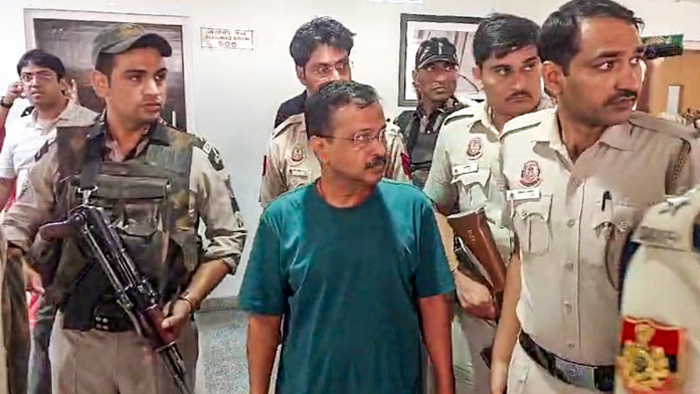Arvind Kejriwal moves SC seeking release from prison
Delhi chief minister Arvind Kejriwal moved the Supreme Court on Monday with a plea to be released from jail in connection with the Delhi excise policy case, where he is under investigation by the Central Bureau of Investigation (CBI).
Challenging his arrest and the remand orders, the Aam Aadmi Party (AAP) chief sought bail as he assailed the Delhi high court’s August 5 judgment that ruled that Kejriwal’s arrest was neither illegal nor without justifiable grounds because the CBI presented “evidently enough evidence” to warrant his detention and remand.
The plea was expected to be mentioned before Chief Justice of India Dhananjaya Y Chandrachud on Monday morning for an urgent hearing. It was filed two days after the Supreme Court granted bail to former Delhi deputy chief minister Manish Sisodia in the excise policy cases probed by the CBI and the Enforcement Directorate (ED). While releasing Sisodia on bail by its order on August 9, the top court held that his long incarceration of 17 months coupled with his continued detention in a case where there is no hope of trial ending anytime soon impinge on his fundamental right to liberty and speedy trial under Article 21 of the Constitution.
Kejriwal has been in custody since March 21 following his arrest by the ED, apart from a 21-day interim bail in May granted by the top court for Lok Sabha election campaigning. On July 12, the Supreme Court granted interim bail to Kejriwal in the ED case, acknowledging that he had spent over 90 days in incarceration. Still, he continued to remain in custody due to his arrest by the CBI on June 26 in the same matter.
The case against the chief minister stems from allegations of irregularities in Delhi’s now-scrapped excise policy of 2021-22, which the CBI began probing following a recommendation by Delhi’s lieutenant governor in July 2022. Kejriwal was the third AAP leader arrested in this connection. Sisodia was incarcerated since February 2023 before he was released on August 9, and Rajya Sabha member Sanjay Singh was granted bail by the top court in April after six months of custody.
In his petition before the Supreme Court, Kejriwal disputed the findings recorded in the high court judgment while asserting that his arrest and remand orders issued by a Delhi court on June 26 and June 29 respectively were illegal and passed in grave contravention of previous Supreme Court judgments which required the investigating agency to issue a prior notice and furnish concrete reasons to justify an arrest.
A mere non-cooperation cannot form a statutory ground to arrest a person, said Kejriwal’s petition, adding the CBI did not point towards any new evidence or material in the arrest memo or the remand note to justify his arrest. He also claimed that his arrest by the CBI was an attempt to scuttle and prevent his release from custody in the money laundering case registered by the ED, after which he was granted bail by the Delhi court on June 20.
On June 20, a Delhi court granted Kejriwal bail in the ED case citing a lack of direct evidence, which was halted by the Delhi high court on June 21 in less than 24 hours. On June 25, a vacation bench in the Delhi high court stayed the bail order saying that the order was perverse and was passed without appreciating the material submitted by the ED.
The Supreme Court granted interim bail to Kejriwal on July 12, noting that he has suffered incarceration for over 90 days and that the issue involves the right to life and liberty of an individual. On the day, the court also referred the issues relating to the legal scope of incorporating “need and necessity to arrest” and the “doctrine of proportionality” into ED cases to a larger bench.
Seeking bail in the CBI case, Kejriwal’s petition in the Supreme Court underscored that he was being subjected to gross persecution and harassment for wholly malafide and extraneous considerations. The plea added that the material based on which the AAP chief was arrested was on record and his arrest one year 10 months after the registration of the first information report smacks of “glaring malafide.” It also stressed that there was absolutely nothing on record to show as to how, why and under what circumstances CBIs perception changed from April 16, 2023, the day when Kejriwal was called as a witness, to his arrest in June 2024.
The high court on August 5 upheld Kejriwal’s June 26 arrest. It found no misuse of power by the investigating officer, noting that his detention was carried out with the proper written orders from the special judge, in accordance with legal procedures. The high court’s ruling also affirmed the trial court’s June 29 order remanding Kejriwal to judicial custody, emphasising that the CBI had provided valid reasons for seeking further remand, which the special judge carefully considered, including Kejriwal’s evasive replies and “non-truthfulness” in disclosing facts during his time in the agency’s custody.

